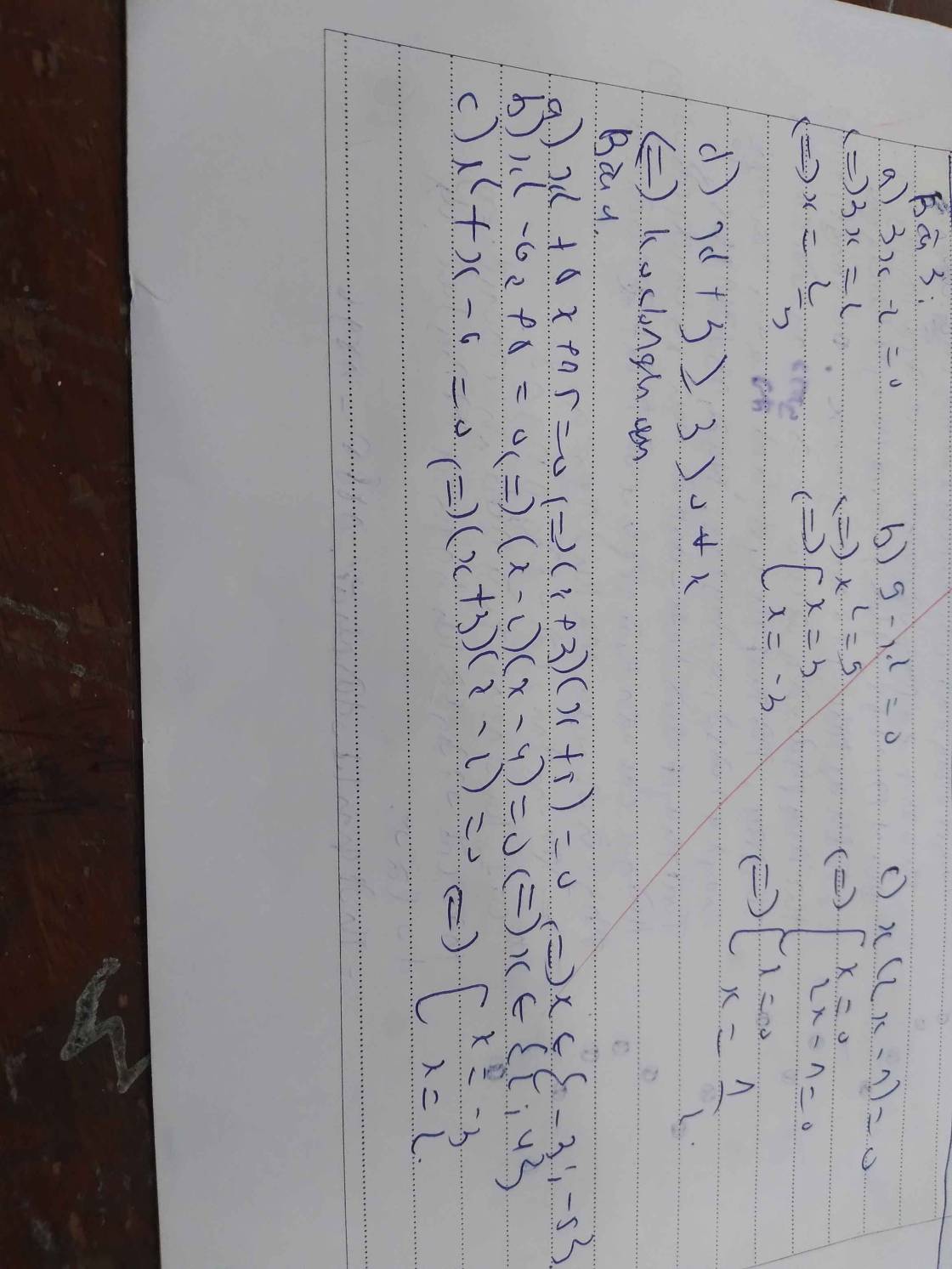Hãy nhập câu hỏi của bạn vào đây, nếu là tài khoản VIP, bạn sẽ được ưu tiên trả lời.

Bài 9:
a: \(A=-0.5x^2yz\cdot\left(-3\right)xy^3z=1.5x^3y^4z^2\)
b: Hệ số là 1,5
Bậc là 9

a) f(x) = x(x - 5) + 2(x - 5)
x(x - 5) + 2(x - 5) = 0
<=> (x - 5)(x - 2) = 0
x - 5 = 0 hoặc x - 2 = 0
x = 0 + 5 x = 0 + 2
x = 5 x = 2
=> x = 5 hoặc x = 2
a, f(x) có nghiệm
\(\Leftrightarrow x\left(x-5\right)+2\left(x-5\right)=0\)
\(\Rightarrow\left(x-5\right)\left(x+2\right)=0\)
\(\Rightarrow\orbr{\begin{cases}x-5=0\\x+2=0\end{cases}}\Rightarrow\orbr{\begin{cases}x=5\\x=-2\end{cases}}\)
->tự kết luận.
b1, để g(x) có nghiệm thì:
\(g\left(x\right)=2x\left(x-2\right)-x^2+5+4x=0\)
\(\Rightarrow2x^2-4x-x^2+5+4x=0\)
\(\Rightarrow x^2+5=0\)
Do \(x^2\ge0\forall x\)nên\(x^2+5\ge5\forall x\)
suy ra: k tồn tại \(x^2+5=0\)
Vậy:.....
b2,
\(f\left(x\right)=x\left(x-5\right)+2\left(x-5\right)\)
\(=x^2-5x+2x-10\)
\(=x^2-3x-10\)
\(f\left(x\right)-g\left(x\right)=x^2+5-\left(x^2-3x-10\right)\)
\(=x^2+5-x^2+3x-10=3x-5\)

b)
\(M\left(x\right)+N\left(x\right)-P\left(x\right)=6x^3+3x^2+2x\\ 6x^3+3x^2-4x+9-P\left(x\right)=6x^3+3x^2+2x\\ P\left(x\right)=6x^3+3x^2+2x-6x^3-3x^2+4x-9\\ P\left(x\right)=\left(6x^3-6x^3\right)+\left(3x^2-3x^2\right)+\left(2x+4x\right)-9\\ P\left(x\right)=6x-9\)
c)
\(P\left(x\right)=0\\ \Leftrightarrow6x-9=0\\ \Leftrightarrow6x=9\\ \Leftrightarrow x=1,5\)

Bài 11:
a: Đặt f(x)=0
=>\(8x^2-6x-2=0\)
a=8; b=-6; c=-2
Vì a+b+c=0 nên pt có hai nghiệm là:
\(x_1=1;x_2=\dfrac{-2}{8}=\dfrac{-1}{4}\)
b: Đặt G(x)=0
\(\Leftrightarrow5x^2-6x+1=0\)
=>5x2-5x-x+1=0
=>(x-1)(5x-1)=0
=>x=1/5 hoặc x=1
c: Đặt h(x)=0
=>-2x2-5x+7=0
\(\Leftrightarrow-2x^2-7x+2x+7=0\)
=>(2x+7)(-x+1)=0
=>x=1 hoặc x=-7/2

a: \(P\left(x\right)=-5x^3+3x^2+2x+5\)
\(Q\left(x\right)=-5x^3+6x^2+2x+5\)
b: \(H\left(x\right)=P\left(x\right)+Q\left(x\right)=-10x^3+9x^2+4x+10\)
\(H\left(\dfrac{1}{2}\right)=-10\cdot\dfrac{1}{8}+\dfrac{9}{4}+2+10=13\)
c: Q(x)-P(x)=6
\(\Leftrightarrow3x^2=6\)
hay \(x\in\left\{\sqrt{2};-\sqrt{2}\right\}\)


a, \(A=2\left(x-1,5\right)-5=0\)
\(2x-3-5=0\Leftrightarrow2x-8=0\Leftrightarrow2x=8\Leftrightarrow x=4\)
b, \(B=-3x+8+6x-9=0\)
\(3x-1=0\Leftrightarrow3x=1\Leftrightarrow x=\frac{1}{3}\)
c, \(C=6x-18x^3=0\)
\(6x\left(1-3x^2\right)=0\Leftrightarrow\orbr{\begin{cases}6x=0\\1-3x^2=0\end{cases}\Leftrightarrow\orbr{\begin{cases}x=0\\3x^2=1\end{cases}\Leftrightarrow}\orbr{\begin{cases}x=0\\x^2=\frac{1}{3}\end{cases}\Leftrightarrow}\orbr{\begin{cases}x=0\\x=\pm\frac{1}{\sqrt{3}}\end{cases}}}\)